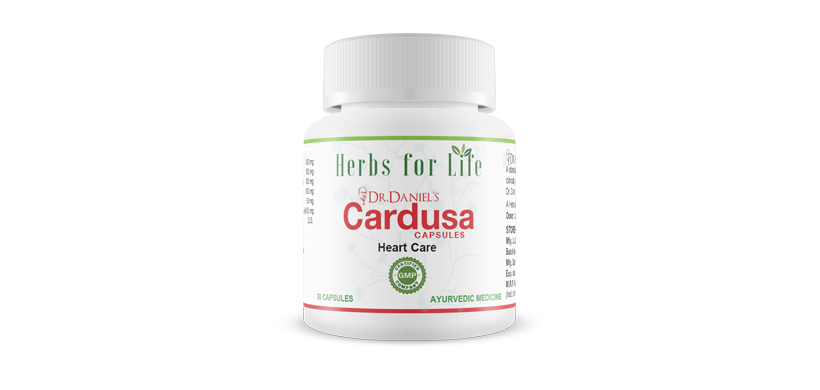Dr. Daniel’s Cardusa.
All the allopathic medicines used for BP and heart problems contain chemicals which will remove/lessen the plaque, decrease oxidized LDL cholesterol (by addition of antioxidants) and thin the blood. Cardusa contains herbal drugs which are clinically proved to have all these properties. The plants used in Cardusa and their proven clinical properties are the following.
- Arjuna (Terminalia arjuna W.& A.). Arjuna bark is the most acclaimed drug for treating disorders of heart. It contains a number of triterpenoids such as arjunic acid and arjunolic acid. It is found to be effective in treating congestive cardiac failure and chronic stable angina (Chest pain). It is also found to inhibit atherosclerotic lesions (plaques) in arteries and veins. It reduces hypertension, and is found to protect heart from myocardial ischemic injury (damage to heart muscle by restricted flow of blood). Arjuna reduces cholesterol, LDL and triglycerides in a span of 50-60 days to 50% and improves HDL content. The antioxidant phenols in Arjuna exhibit a blood thinning effect similar to aspirin. It helps the body in preventing cancer also.
- Garlic (Allium sativum Linn.). Garlic is conventionally used for reducing cholesterol, LDL, triglycerides and thus inhibits atherosclerotic plaques. Garlic contains at least 33 sulphur compounds like allin, allicin, ajoene etc. Ajoene has the best known anti-thrombosis and cholesterol lowering qualities. Garlic reduces vascular calcification due to high cholesterol levels and dilates blood vessels.
- Sunthi (Zingiber officinale Ros.) Several of ginger constituents exhibit anti-platelet activity similar to aspirin and thus recommended as therapeutic agents for coronary artery disease(angina) and to prevent stroke. It reduces arthrosclerotic lesions and lipid peroxidation while enhancing fibrinolytic activity. Ginger extracts are found to reduce cholesterol, LDL, VLDL and phospholipids and improve HDL.
- Mitho limdo (Murraya koenigii Spreng). Curry leaves containing an aromatic oil and alkaloids (both carbazole and triterpenoid) like koenigin, girinimbin, iso-mahanimbin, are found to exhibit cholesterol lowering effect like the standard cholesterol reducing agent, simvastatin. It also reduces lipid peroxidation (thus lower lipid levels) and lowers anticholinesterase in brain, enhancing memory.
- Manjishta (Rubia cordifolia Linn.). This drug is one of the best blood purifiers. With its anthra- and naphthoquinones (rubiadin, mollugin) and cyclic hexapeptides (RA-VII) manjishta is a calcium channel blocker ( reducing blood pressure and hypertension), anti-platelet (reduces blockage of arteries) and antihyperlipidemic in nature. It is also one of the richest sources of antioxidants. It eliminates toxins in blood and improves microcirculation in all parts of body especially brain. Its vasodilating property widens the lumen of blood vessels and decrease blood pressure and hypertension.
- Vijaysar (Pterocarpus marsupium Roxb.). This plant is rich in flavonoids such as liquiritigenin and pterosupin which are found to lower serum cholesterol, LDL and arthrosclerosis significantly.

